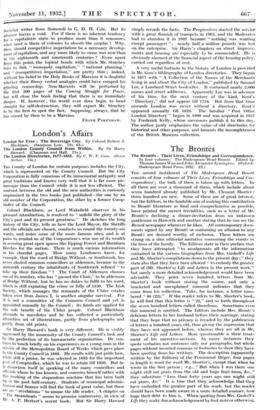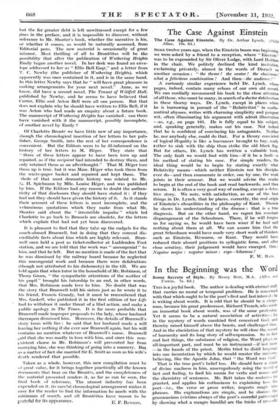The Brontës
The Bronas : Their Lives, Friendships and Correspondence. In four volumes: The Shakespeare Head Bronte. Edited by Thomas James Wise and John Alexander Symington. (Oxford.: Shakespeare Head Press, 1932. £3.) THE second instalment of The Shakespeare Head Rronte consists of four volumes of Their Lives, Friendships and Cor- respondence ; the bulk of these is taken up with letters. In all there are over a thousand of them, which include about seven hundred already published by Mr. Clement Shorter :
three hundred are new. Some of these are of great interest, but the Editors, in the laudable aim of making this contribution to Brontë literature as final and comprehensive as possible, have printed the merest trivialities, such as a letter of Mr.
Bronte's declining a dinner-invitation from an unknown gentleman in Haworth and another stating that he can see the Record newspaper whenever he likes. All contemporary docu- ments signed by any Brontë or containing an allusion to any Brontë are deemed worthy of inclusion. These letters are strung on a slim editorial narrative concerning the events in the lives of the family. The Editors state in their preface that they have attempted " to amalgamate all the information contained in the various biographies from Mrs. Gaskell's Life and Mr. Shorter's compilations down to the present day :" they state also that they have been allowed " to embody the greater part of (Mr. Shorter's) Life and Letters in the present work," but surely a more detailed acknowledgement would have been advisable. They print seven hundred letters from Mr. Shorter's book without stating the source, and only a bracketed and unexplained numeral indicates that they come from his collection. Take, for instance, a letter num- bered " 46 (22)." If the reader refers to Mr. Shorter's book, he will find that this letter is " 22," and so forth throughout the seven hundred letters culled therefrom. Sometimes even this numeral is omitted. The Editors include Mrs. Brontes delicious letters to her husband before their marriage, stating that they hope that no privacy is invaded by the publication of letters a hundred years old, thus giving the impression that they have not appeared before, whereas they are all in Mr. Shorter's Life and Letters. More questionable is their treat- ment of his narrative-sections. In many instances they quote verbatim not sentences only nor paragraphs, but whole pages without inverted commas or footnotes to show they have been quoting from his writings. The description (apparently written by the Editors) of the Pensionnat Heger, four pages in length is word for word Mr. Shorter's, except that when he wrote in the first person ; e.g., " But when I was there one might still eat pears from the old and huge fruit-trees, &c.," they substitute " Less than forty years ago one might still eat pears, &c." It is true that they acknowledge that they have embodied the greater part of his work, but the reader should have been made aware in a more detailed manner, how huge their debt to him is. When quoting from Mrs. Gaskell's Life they make due acknowledgement by foot-note or otherwise. but the far greater debt is left unwitnessed except for a few lines in the preface, and it is impossible to discover, without reference to Mr. Shorter's book, whether the narrative is his, or whether it comes, as would be naturally assumed, from
• Editorial pens. The new material is occasionally of great interest. Most thrilling of all to Bronteites will be the possibility that after the publication of Wuthering Heights Emily began another novel. In her desk was found an enve- lope addressed to her as " Ellis Bell Esqr," and a letter from T. C. Newby (the publisher of Wuthering Heights), which apparently was once contained in it, and is in the same hand. In this letter Newby says that he " will have great pleasure in making arrangements for your next novel." Anne, as we know, did have a second novel, The Tenant of Wildfell Hall, published by Newby, and he seems to have believed that Currer, Ellis and Acton Bell were all one person. But that doe:3 not explain why he should have written to Ellis Bell, if it was Acton who had made an enquiry about a future book. The manuscript of Wuthering Heights has vanished . can there have vanished with it the manuscript, possibly incomplete, of another novel by Emily ?
Of Charlotte Bronte we have little new of any importance, though the chronological insertion of her letters to her pub- lisher, George Smith, into the rest of her correspondence is convenient. But the Editors seem to be ill-informed on the history of her letters to M. Heger. They state that
three of these letters appear to have been torn up and repaired, as if the recipient had intended to destroy them, and only retained them as an afterthought." That M. Heger tore them up is true, but it was Mme. Heger who took them from the waste-paper basket and repaired and kept them. The whole of that most dramatic history was related to Mr. 7.1. H. Spielmann by Mlle. Louise Heger, and was published by him. If the Editors had any reason to doubt the authen- ticity of that disclosure they should have stated it : if they had not they should have given the history of it. As it stands 'their account of these letters is most incomplete, and the voluminous quotations which they make from what Mr. Shorter said about the " irresistible impulse " which led Charlotte to go back to Brussels are obsolete, for the letters which explain that had not yet been discovered.
It is pleasant to fmd that they take up the cudgels for the much-abused Branwell, but in doing that they conceal dis- creditable facts about him which are highly relevant. Bran- well once held a post as ticket-collector at Luddenden Foot station, and we are told that the work was " uncongenial " to him, and that he left. But no mention is made of the fact that he was dismissed by the railway board because he neglected this uncongenial work and because there were defalcations (though not attributed to his dishonesty) in the till. We are told again that when tutor in the household of Mr. Robinson, of Thorp Green, " the sympathetic attentions of the mother of his pupil" brought his tutorship to an end, in other words, that Mrs. Robinson made love to him. No doubt that was the story that Branwell told his sisters just as he wrote it to his friend, Francis Grundy, but it must be remembered that Airs. Gasket!, who published it in the first edition of her Life had to withdraw it under threat of a libel action, and make a public apology in The Times. It is far more probable that Branwell made improper proposals to the lady, whose husband thereupon dismissed him. Moreover, the details of Branwell's story teem with lies : he said that her husband made a will leaving her nothing if she ever saw Branwell again, but his will contains no mention whatever of Branwell's name. Branwell said that she was madly in love with him, and since this non- existent clause in Mr. Robinson's will prevented her from marrying him, she was thinking of going into a nunnery. But as a matter of fact she married Sir E. Scott as soon as his wife's death rendered that possible.
Taken as a whole, however, this new compilation must be of great value, for it brings together practically all the known documents that bear on the Brontes, and the completeness of the material presented renders it, as far as can be seen, the final book of reference. The utmost industry has- been expended on it, its careful chronological arrangement makes it easy for the reader to find the information he needs with the minimum of search, and all Bronteites have reason to be































 Previous page
Previous page